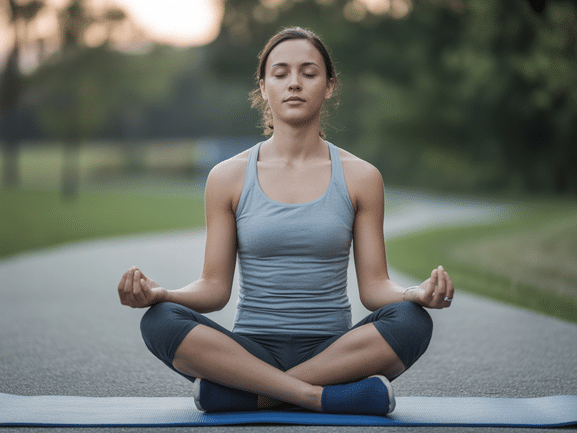5 Powerful Meditation Techniques to Ease Menopause Symptoms Naturally
Discover evidence-based meditation practices that can help you navigate menopause with greater peace, balance, and comfort. These gentle yet effective techniques address the most common challenges women face during this transformative phase.
Menopause doesn’t have to feel like an uphill battle. While this natural transition brings unique challenges—from hot flashes and sleep disruptions to mood swings and anxiety—meditation offers a powerful, natural approach to finding relief and embracing this new chapter with grace.
<p>Research shows that <strong>meditation for menopause symptoms</strong> can significantly reduce the severity of physical discomfort while improving emotional well-being. Moreover, these practices help you develop a deeper connection with your changing body, fostering self-compassion during this transformative time.</p>
<blockquote style="background-color: #f8f9fa; padding: 1rem; border-left: 4px solid rgb(26,50,69);">
<p><strong>Did you know?</strong> Studies indicate that women who practice regular mindfulness meditation experience 40% fewer severe hot flashes and improved sleep quality within just 8 weeks.</p>
</blockquote>
<h2>Understanding the Mind-Body Connection During Menopause</h2>
<p>Before diving into specific techniques, it's essential to understand how meditation works during menopause. As hormone levels fluctuate, your nervous system becomes more reactive to stress. <strong>Mindfulness menopause</strong> practices help regulate this response, creating a sense of calm that positively impacts both physical symptoms and emotional balance.</p>
<p>Furthermore, meditation activates the parasympathetic nervous system, which counteracts the stress response that often intensifies menopausal symptoms. This biological shift can lead to improved temperature regulation, better sleep patterns, and enhanced mood stability.</p>
<h2>5 Evidence-Based Meditation Techniques for Menopause Relief</h2>
<h3>1. Cooling Breath Meditation for Hot Flashes</h3>
<div itemscope itemtype="http://schema.org/HowTo">
<p itemprop="description">This specialized breathing technique helps regulate body temperature and provides immediate relief when you feel a hot flash approaching.</p>
<ol itemprop="supply">
<li>Sit comfortably with your spine straight</li>
<li>Curl your tongue into a tube shape (or purse your lips if unable)</li>
<li>Inhale slowly through your curled tongue for 4 counts</li>
<li>Close your mouth and exhale through your nose for 6 counts</li>
<li>Repeat for 5-10 cycles</li>
</ol>
<p><strong>Pro tip:</strong> Practice this technique 2-3 times daily, even when you're not experiencing symptoms, to build your body's natural cooling response.</p>
</div>
<h3>2. Progressive Body Scan for Tension Release</h3>
<p>Many women experience increased muscle tension and joint stiffness during menopause. This <strong>meditation hot flashes</strong> technique also addresses physical discomfort throughout the body.</p>
<div style="background-color: #f0f8ff; padding: 1rem; border-radius: 8px; margin: 1rem 0;">
<p><strong>Quick Start Guide:</strong></p>
<ul>
<li>Begin at the top of your head</li>
<li>Slowly scan down through each body part</li>
<li>Notice any tension without judgment</li>
<li>Breathe into tense areas and visualize release</li>
<li>Complete the scan from head to toes (10-15 minutes)</li>
</ul>
</div>
<h3>3. Loving-Kindness Meditation for Emotional Balance</h3>
<p>Hormonal changes can trigger mood swings and self-criticism. This <strong>menopause anxiety relief</strong> practice cultivates self-compassion and emotional resilience.</p>
<p>Start by directing kind wishes toward yourself: "May I be peaceful, may I be comfortable in my changing body, may I embrace this transition with grace." Then, extend these wishes to loved ones and eventually to all beings experiencing similar challenges.</p>
<h3>4. Sleep-Inducing Meditation for Better Rest</h3>
<p>Insomnia affects up to 60% of menopausal women. Consequently, this gentle practice helps quiet racing thoughts and prepare your body for restorative sleep.</p>
<p>Use a combination of deep breathing, gentle body movements, and visualization of peaceful scenarios. Practice this technique 30 minutes before bedtime to signal your nervous system that it's time to wind down.</p>
<h3>5. Mindful Movement for Energy and Vitality</h3>
<p>Combat fatigue and boost energy levels with this active meditation approach that combines gentle movement with mindful awareness.</p>
<p>Whether it's tai chi-inspired movements, gentle stretching, or mindful walking, this practice helps you reconnect with your body's wisdom while promoting circulation and flexibility.</p>
<p>Ready to experience these techniques with expert guidance? <a href="https://vitalizen.app/start-now" title="Start your meditation journey today">Begin your journey with Vitalizen.app's specialized menopause meditation programs</a> designed specifically for women in transition.</p>
<h2>Creating Your Daily Practice: A <strong>Peaceful Menopause Transition</strong></h2>
<p>Consistency is key when developing a meditation practice for menopause. However, you don't need hours of practice to see results. Start with just 10 minutes daily and gradually increase as you feel comfortable.</p>
<div style="background-color: #fff5f5; padding: 1rem; border-radius: 8px; margin: 1rem 0;">
<h4>Sample Daily Schedule:</h4>
<ul>
<li><strong>Morning (5 minutes):</strong> Cooling breath meditation</li>
<li><strong>Midday (10 minutes):</strong> Body scan when stress peaks</li>
<li><strong>Evening (15 minutes):</strong> Sleep meditation or loving-kindness practice</li>
</ul>
</div>
<p>Additionally, consider incorporating <strong>hormone balance meditation</strong> into your routine during times when symptoms are most challenging. The <a href="https://vitalizen.app/#about" title="Learn more about Vitalizen's approach">Vitalizen.app platform</a> offers personalized meditation schedules that adapt to your specific needs and symptom patterns.</p>
<h2>The Science Behind Meditation and Menopause</h2>
<p>Recent studies published in the <em>Journal of Clinical Medicine</em> demonstrate that mindfulness-based interventions can reduce menopausal symptoms by up to 50%. Meanwhile, neuroimaging research shows that regular meditation practice actually changes brain structure, improving areas responsible for emotional regulation and stress response.</p>
<p>These findings validate what many women discover through practice: meditation isn't just a temporary fix—it's a tool for long-term transformation and empowerment during menopause and beyond.</p>
<blockquote style="background-color: #f0f8ff; padding: 1rem; border-left: 4px solid rgb(26,50,69);">
<p><em>"Meditation taught me to surf the waves of menopause rather than being overwhelmed by them. It's given me back my sense of control and peace."</em> - Sarah, Vitalizen user</p>
</blockquote>


